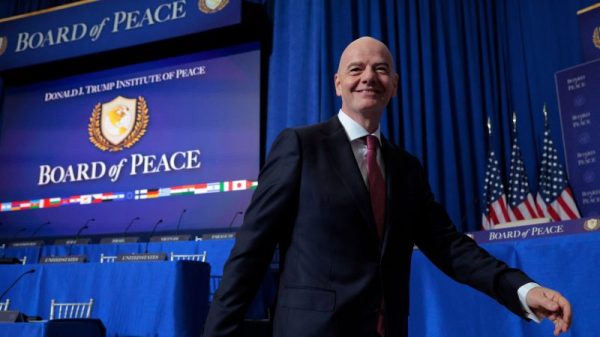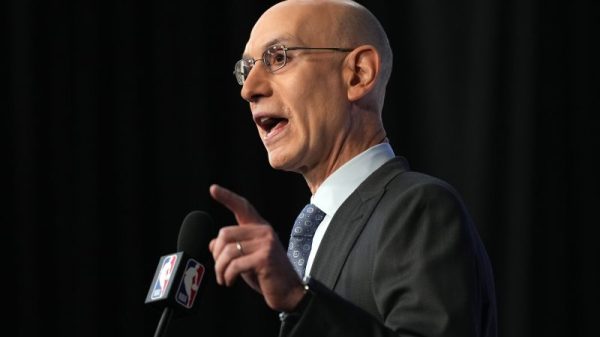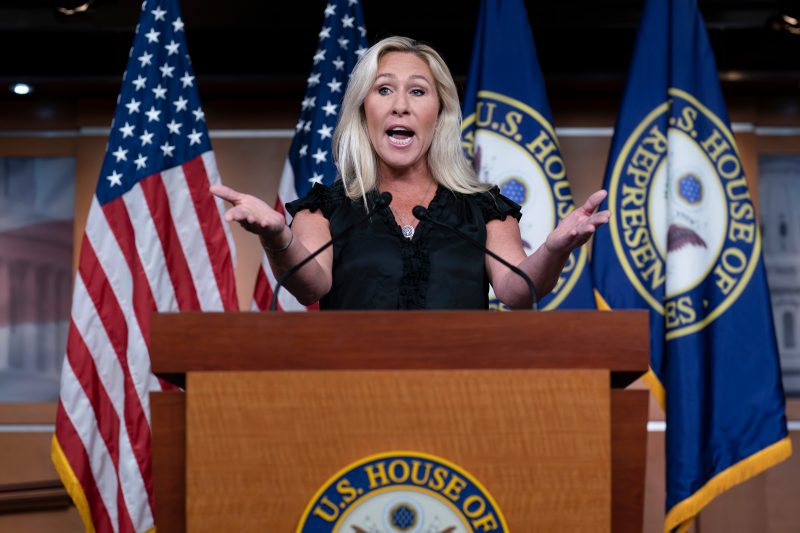On Thursday morning, Rep. Marjorie Taylor Greene gathered the press to announce that she was introducing a slew of articles of impeachment against various government officials. The Georgia Republican has 10 existing impeachment resolutions under her belt, so this itself was not really news.
Greene did, however, make a comment worth parsing.
Fielding questions from reporters, Greene was asked about an exchange between her and Rep. Jamaal Bowman (D-N.Y.) on Wednesday afternoon. Reporters were there and captured the scene.
Rep. Jamaal Bowman and Rep. Marjorie Taylor Greene outside the Capitol after George Santos had press gaggle with reporters: pic.twitter.com/qtmIerPwoB
— Emily Brooks (@emilybrooksnews) May 18, 2023
“What concerns me about Jamaal Bowman is he has a history of aggression, not just towards others but towards me in particular,” Greene said, “and I’m very concerned about it.”
She claimed that when she came to New York to protest the indictment of Donald Trump last month, Bowman “led a mob” to the courthouse and put her life in danger. That’s a mischaracterization — it’s certainly not as though Bowman drew tens of thousands of people to a speech during which he encouraged them to march toward a confrontation with an opponent. Bowman did heckle her, but the response she sparked was not his doing. She also claimed that Bowman pushed Rep. Thomas Massie (R-Ky.), an incident that Massie described as Bowman pushing between him and cameras.
But that wasn’t the worst of it, according to Greene.
“I will tell you what’s on video is Jamaal Bowman shouting at the top of his lungs, cursing, calling me a horrible — calling me a white supremacist, which I take great offense to,” she said. “That’s like calling a person of color the n-word, which should never happen. Calling me a white supremacist is equal to that. That is wrong.”
To quote John Mulaney: First off, no. No, it’s not.
Let’s start with the basics. It is certainly not nice to call someone a white supremacist, and the pejorative can be used in an effort to disparage someone. But it is a phrase used to describe someone’s beliefs, not their physical characteristics. You can choose to believe in the supremacy of White people and, in so doing, earn the appellation “white supremacist.”
That is not how the n-word works. That word is simply used to describe people based on skin color. It is a disparagement not of what they choose to espouse but of a physical characteristic they don’t control. What’s more, it’s an attack based solely on that characteristic and the speaker’s belief that this characteristic is somehow worthy of mockery or diminishment.
This is a long way of saying that using the n-word as a pejorative is inherently racist, a disparagement of millions of people. Calling someone “white supremacist” is not. Even when used as an unfair attack, it’s specific to that person, not to everyone like them.
(Mulaney might add: You know how I know “white supremacist” isn’t as bad as the n-word? Because we’re saying “white supremacists.”)
It is not a surprise that Greene equates them, however.
Last week, Sen. Tommy Tuberville (R-Ala.) chose to defend the presence of white nationalists in the U.S. armed forces. His rationale wasn’t that he condoned their views as such but, instead, that the left used the term “white nationalists” as a proxy for people on the right.
As I wrote at the time, Tuberville was getting his party’s rhetoric backward. Instead of claiming that the left was calling good, honest Americans racist, he was arguing that racists are good, honest Americans.
But the point is that Tuberville and Greene see the appellation “white supremacist” as to at least some extent inherently invalid, an arm of what they perceive to be the left’s use of race as a cudgel. Particularly since 2014 — with the emergence of Black Lives Matter and the dominance of Trump — there’s been a widening gap between the parties on questions of race and discrimination. Democrats, particularly White Democrats, see racism as embedded in systems of power and continuing to disadvantage non-White (and particularly Black) Americans. White Republicans, meanwhile, are more likely to say that Whites face discrimination than they are to say that of Blacks.
This is in part a response to the right’s fears that America is growing more diverse, fears that provide an opportunity for right-wing media and politicians to stoke a sense of embattlement and grievance among their heavily White base. That sense, by extension, makes it easier to view things like being criticized for your views on race — or being called “white supremacist” — as yet another unfair attack.
Greene’s comments about Bowman weren’t simply complaints that he had allegedly used that pejorative to describe her.
“He has aggressive — his physical mannerisms are aggressive,” she said at another point. ” … I think there’s a lot of concern about Jamaal Bowman. So, and I am concerned about it. I feel threatened by him.”
“I am very concerned about Jamaal Bowman,” she added when concluding her response, “and he’s someone that people should watch.”
For what it’s worth, perceptions of Black men as being more threatening than similar-size White men are a documented demonstration of bias. That’s an observation I’m making, mind you, not a racial slur.



























